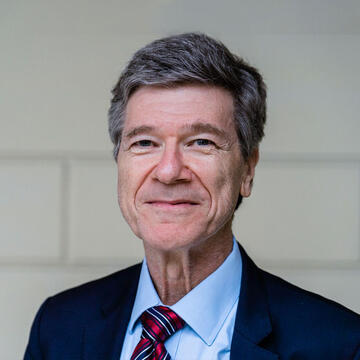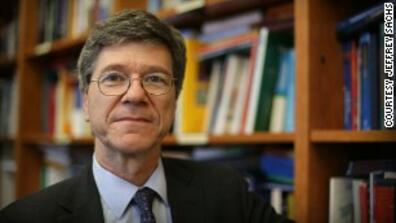
Jeffrey Sachs
University Professor and Director, Center for Sustainable Development

Personal Details
Focus areas: Relationship of international trade and economic growth, the resource curse and extractive industries, public health, the history of economic development, economic geography, strategies of economic reform, international financial markets, macroeconomic policy, global competitiveness, climate change, the role of universities in economic development, the end of poverty
Jeffrey D. Sachs is a world-renowned professor of economics, leader in sustainable development, senior UN advisor, bestselling author, and syndicated columnist whose monthly newspaper columns appear in more than 100 countries. He is the co-recipient of the 2015 Blue Planet Prize, the leading global prize for environmental leadership, and has twice been named among Time Magazine’s 100 most influential world leaders.
Professor Sachs served as the Director of the Earth Institute at Columbia University from 2002 to 2016. During that time, he led a university-wide organization of more than 850 research scientists and policy experts in support of sustainable development, championed the Masters of Development Practice (MDP) program, which is now offered at 30 universities around the world, and helped to introduce the PhD in Sustainable Development at Columbia University. He was appointed University Professor at Columbia University in 2016 and also serves as Quetelet Professor of Sustainable Development and Professor of Health Policy and Management. He is Special Advisor to United Nations Secretary-General Ban Ki-moon on the Sustainable Development Goals, and previously advised both Secretary-General Ban Ki-moon and Secretary-General Kofi Annan on the Millennium Development Goals. He is a Distinguished Fellow of the International Institute of Applied Systems Analysis in Laxenburg, Austria.
Professor Sachs is widely considered to be one of the world’s leading experts on economic development, global macroeconomics, and the fight against poverty. His work on ending poverty, overcoming macroeconomic instability, promoting economic growth, fighting hunger and disease, and promoting sustainable environmental practices has taken him to more than 125 countries. Over the past thirty years, he has advised dozens of heads of state and governments on economic strategy in the Americas, Europe, Asia, Africa, and the Middle East. He was among the outside advisors to Pope John Paul II on the encyclical Centesimus Annus and currently works closely with the Pontifical Academy of Sciences and the Pontifical Academy of Social Sciences on issues of sustainable development.
Prior to his arrival at Columbia University in July 2002, Professor Sachs spent over twenty years as a professor at Harvard University, where he served as the Director of the Center for International Development and the Galen L. Stone Professor of International Trade. Sachs was born in Detroit, Michigan, in 1954. He received his B.A., summa cum laude, from Harvard College in 1976, and his M.A. and Ph.D. from Harvard University in 1978 and 1980 respectively.
Education
- PhD, Harvard University
- MA, Harvard University
- BA, Harvard University
Research And Publications
In The Media
Jeffrey Sachs presented in the third installment of a fall lecture series entitled “The American State in a Multipolar World” on the importance of global cooperation amid current tensions between the United States and China, focusing on the goals of sustainable development, the potential climate consequences of a cold war between the United States and China, American exceptionalism and the threats it poses to international peace.
Jeffrey Sachs was nominated by Pope Francis to be an Ordinary Member of the Pontifical Academy of Social Sciences on October 25.
Jeffrey Sachs claiming the humanity can end extreme poverty “basically immediately” within six months to a year kindled the discussion on what is necessary for prosperity and improvement.
Jeffrey Sachs discusses what needs to happen at COP26 in order to put the world on track to contain climate change. He argues that restructuring our energy system does not need to come at the cost of economic wellbeing.
Jeffrey Sachs emphasized the need for cooperations over geopolitical friction to understand and end the COVID-19 pandemic and prevent future pandemics.



